The Importance of a Strong Immune System During Cold and Flu Season
As the weather turns colder and people spend more time indoors, cold and flu season begins in earnest. During this time of year, it becomes especially important to support immune system function. A strong immune system can mean the difference between fighting off a cold or flu quickly, or developing a more serious illness that lingers for weeks.
What does it mean to have a robust immune system heading into the winter months? Essentially, it means having enough key micronutrients to enable your body’s defenses to work optimally. An immune system firing on all cylinders will be poised and ready to identify foreign invaders like viruses and bacteria, and respond swiftly to neutralize the threat before you develop full-blown symptoms.
Conversely, an immune system that lacks important vitamins, minerals and nutrients may respond more sluggishly, allowing viruses and bacteria multiple opportunities to gain footholds and replicate. The end result may be the development of a nasty cold that hangs on for two weeks or more.
So how can you maximize immune resilience as cold and flu season ramps up? One of the best defenses is to build your diet around a variety of colorful fruits and vegetables, whole grains, beans, lentils, nuts and seeds. These provide antioxidants like Vitamin C, as well as essential minerals like zinc that are directly involved in immune response. Bone broths and probiotic foods also nurture gut health, which translates to whole-body wellness. Additionally, incorporating anti-inflammatory herbs and spices provides concentrated plant compounds that bolster immunity.
Overall, a varied whole foods diet focused on immune-strengthening ingredients is a buffer against the cold, flu and other invaders. As winter wellness relies heavily on robust immune function, a strategic approach to eating can make all the difference in staying vibrant, energetic and healthy during the colder months. Read on to learn more about the top foods, herbs and nutrients for building resilience right now and staying well all season long.
The Key Role of Micronutrients
Why are vitamins, minerals and other micronutrients so vital for proper immune function? Simply put, they enable all aspects of your innate and adaptive immune systems to operate efficiently. From providing energy to cells to assisting with protein synthesis for antibodies, micronutrients keep every component of your complex immune defenses running smoothly.
Deficiencies in any key micronutrients can hinder immune mechanisms. For example, without adequate Vitamin D that is acquired from sunlight exposure and certain foods, immune cells become less effective at attacking pathogens. Low zinc inhibits the development of important fighter cells called neutrophils and natural killer cells. Too little Vitamin C depresses immune cell function and antibody production.
In essence, missing key micronutrients during winter can dampen your body’s defenses, opening up vulnerabilities that cold and flu viruses exploit to make you sick. Boosting intake of immune-strengthening foods gives your system what it needs to thwart those viruses before they get you under the weather.
Antioxidants Prevent Immune Cell Damage
In addition to enabling proper immune function, micronutrients act as antioxidants that protect your immune cells from free radical damage. Free radicals are unstable compounds that accrue more often when immune cells ramp up activity to fight viruses and bacteria. Too much free radical exposure literally damages immune cells, aging them prematurely. Antioxidants counteract this damage.
Many colorful fruits and vegetables provide antioxidant flavonoids, carotenoids and Vitamin C that safeguard immune cells. Their vibrant plant pigments are clues to their antioxidant richness. By filling your diet with nature’s rainbow, you supply layers of antioxidant protection that prevent immune cell aging during busy cold and flu season. This preserves the vigor of your system so it continues effectively identifying and destroying threats.
Gut Health Supports Overall Immune Resilience
One aspect of whole body immunity that is often overlooked is the gut microbiome. These trillions of beneficial bacteria support digestive health, and so much more. A well-balanced gut microbiome trains immune cells and regulates inflammatory processes. Abundant good bacteria also form a barrier that inhibits viruses and other pathogens from gaining footholds in the first place.
Supporting a thriving gut microbiome translates to whole body wellness, especially robust immune function. You can nurture your gut bacteria by regularly consuming fermented foods like yogurt, kefir, sauerkraut and kimchi. Prebiotic fiber from leeks, onions, garlic and other plant foods feeds beneficial gut flora as well. When your gut microbiome is nourished with probiotic and prebiotic foods, your immune defenses function at their peak.
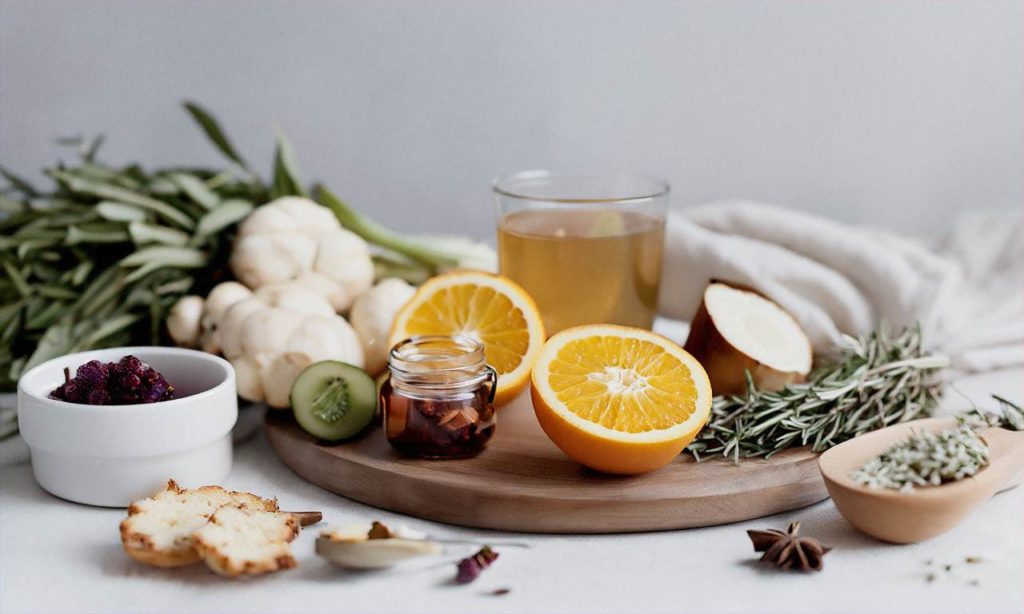
The bottom line is that immune resilience relies on an array of micronutrients, antioxidants and beneficial gut bacteria. Cold and flu season creates extra demands on your body’s defenses as you encounter more threats. Building your diet around anti-inflammatory whole foods strengthens immunity to meet winter’s challenges and stay well.
Foods Rich in Vitamin C: Citrus Fruits, Bell Peppers and Broccoli
Vitamin C is an essential nutrient when it comes to supporting immune health, especially during cold and flu season. Getting enough vitamin C helps boost the production of lymphocytes and phagocytes – white blood cells that help fight off infection. It’s also a powerful antioxidant that can help reduce inflammation. Luckily, many delicious fruits and vegetables are high in this vital nutrient.
Citrus Fruits
Citrus fruits like oranges, grapefruits, lemons and limes are among the best sources of vitamin C. Just one medium orange contains over 70 mg, meeting your daily requirement. Citrus fruits also provide antioxidants like vitamin E, flavonoids and essential oils that further support immunity. Squeezing some fresh lemon in your tea or water is a tasty way to increase your vitamin C intake this winter.
Strawberries
Sweet, juicy strawberries are in season during winter in warmer climates. These bright red berries provide a whopping 100 mg of immune-boosting vitamin C per cup. Strawberries also have antioxidant and anti-inflammatory benefits from compounds called anthocyanins, which give them their vibrant color. Adding fresh strawberries to your morning yogurt or overnight oats gives a tasty boost to start your day.
Bell Peppers
Crisp, sweet bell peppers are an excellent source of vitamin C no matter what color variety you choose. One large red, yellow or orange bell pepper has over 300 mg – that’s three times more than an orange! Bell peppers also contain vitamin A, vitamin B6 and folate, which work synergistically with vitamin C to support immune health. Roast peppers drizzled with olive oil or slice them up in salads, tacos, sandwiches and more this winter.
Broccoli
This cruciferous vegetable may not seem like an obvious choice, but just one cup of broccoli florets provides more than 130 mg of vitamin C, along with immune-supporting vitamin A, vitamin E, and antioxidant sulforaphane. The vitamin C in broccoli gets an extra boost from the sulfur-containing compounds it contains. Broccoli is so good for you, there’s no wrong way to eat it – roast it, steam it, add it to pasta, rice, frittatas or soup.
The key is to include a variety of vitamin C-rich fruits and vegetables in your diet regularly during cold season. Not only will this help safeguard your immune system by providing antioxidants and anti-inflammatory compounds, it will also ensure you meet the RDI (Recommended Daily Intake) for vitamin C of 75-90 mg per day for adults. Aim for at least one serving at every meal and snack to keep your levels consistently high. Pairing vitamin C-rich foods with spices like turmeric, garlic and ginger provides even more protective plant compounds to help you stay healthy. Focusing on whole food sources provides immune-strengthening benefits over supplements alone.
Zinc-Rich Foods to Help Support Immune Function
Zinc is an essential mineral that plays a vital role in immune health. Getting enough zinc in your diet can help strengthen your body’s defenses against illness and infection during the cold winter months. This section of “Winter Wellness: Immune-Boosting Foods and Herbs” will explore some of the top zinc-rich foods that can help support immune function.
The Importance of Zinc for Immunity
Zinc is needed for the healthy development and functioning of various immune cells, including T-cells, B-cells and natural killer cells. These cells work together to identify and destroy pathogens like viruses and bacteria that can make you sick. Zinc also helps regulate inflammation in the body. Chronic inflammation is linked to conditions like autoimmune disease and cancer. Getting sufficient zinc from your diet is key for keeping inflammation in check and your immune system in proper working order.
Best Food Sources of Zinc
There are many delicious whole food sources that provide a variety of important vitamins, minerals and compounds along with zinc to give your body an immune boost. Some of the top zinc-rich foods to include in your diet during cold and flu season include:
Oysters – Just 6 medium oysters provide nearly 500% of your recommended daily intake of zinc, in addition to immune-supporting selenium and vitamin B12. Enjoy oysters raw, baked or broiled for the most nutrition benefits.
Beef and lamb – A 3-ounce serving of beef chuck roast or lamb leg provides around 30% of the zinc you need each day for immune defenses and cell growth. Go for grass-fed, organic varieties when possible.
Pumpkin seeds – 1 ounce of roasted pumpkin seeds delivers nearly 20% of the recommended zinc intake. Pumpkin seeds also provide plant compounds like carotenoids and phenolic acids that can help reduce oxidative stress and inflammation.
Chickpeas and beans – Enjoy chickpeas, lentils, black beans, kidney beans and baked beans to increase the amount of fiber, plant-based protein, zinc and key micronutrients in your diet. Just 1 cup of cooked chickpeas has 12% of the zinc you need in a day.
Cashews and pine nuts – Choose unsalted cashews and pine nuts for snacks and meals to get more zinc from your diet. An ounce of cashews has 13% of your daily zinc needs. The healthy fats may also help your body absorb more zinc.
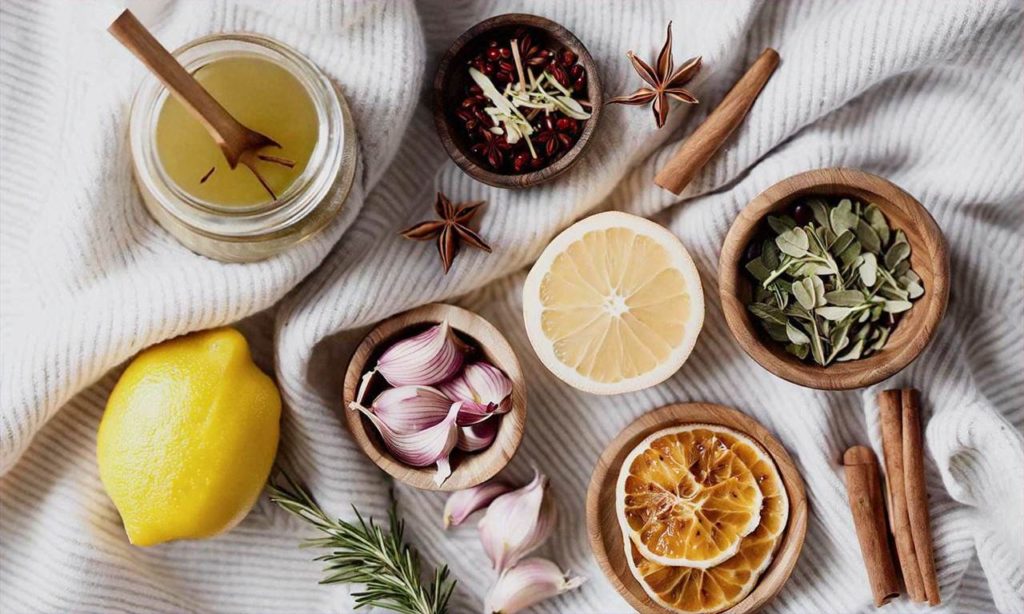
Fortified cereals – Opt for whole grain cereals like wheat flakes and bran flakes that have been fortified with zinc and other vitamins and minerals important for immunity, especially during cold winter months when fresh produce is less abundant.
Mushrooms – In addition to zinc, nutrient-dense mushrooms provide B vitamins like riboflavin and niacin that support immune function. Shiitake and maitake mushrooms are particularly high in zinc.
Chicken and turkey – Poultry like chicken and turkey supply zinc in addition to immunity-boosting selenium, B vitamins and protein. Three ounces of light meat turkey has around 15% of an adult’s zinc needs for the day.
Yogurt and kefir – Probiotic-rich yogurt and kefir made from low-fat or whole milk are tasty calcium-rich options that provide zinc and gut-healthy live cultures that can help strengthen your body’s defenses against germs.
Ways to Get More Zinc in Your Diet
Making an effort to regularly include several zinc-containing foods in your balanced diet can help ensure you meet your daily zinc needs of around 8-11 mg for adult women and men. This will help keep your immune system strong and resilient throughout the winter season. Here are some diet tips for getting more zinc:
– Start your day with a breakfast high in zinc like a veggie and mushroom omelet with yogurt and pumpkin seeds on the side
– Enjoy oysters or other zinc-rich shellfish like mussels or crab several times per month
– Choose chickpeas, lentils, cashews and fortified whole grains like barley or brown rice for zinc-boosting sides and ingredients
– Snack on a trail mix with nuts, seeds and dried fruit for an immunity boost
– Make turkey chili or lamb stew with beans and plenty of vegetables like tomatoes and spinach
– Use probiotic kefir or yogurt to make smoothies with fruit, greens and seeds
Pairing zinc-containing foods with vitamin C-rich fruits and vegetables can further help your body absorb and utilize this key mineral. Getting enough zinc from natural food sources along with other immunity-supporting nutrients is key for “Winter Wellness: Immune-Boosting Foods and Herbs” and staying healthy when colds and flu are going around.
Herbal Teas with Antioxidant and Anti-Inflammatory Benefits
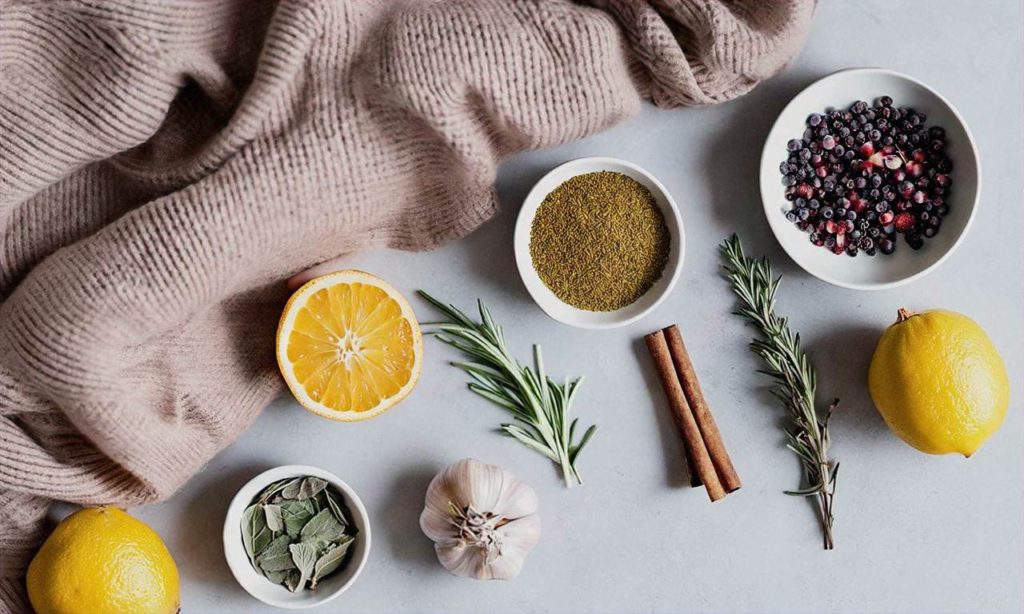
As the weather turns cold and flu season ramps up, herbal teas can be a tasty way to help support your immune system. Many common herbs used for tea have antioxidant, anti-inflammatory and antimicrobial properties that make them useful for wellness during the winter months. Sipping on some comforting herbal tea is also a self-care ritual that can help reduce stress, which takes a toll on immunity. Here are some of the top herbal teas to help boost your defenses this winter.

Ginger Tea
Ginger root is highly anti-inflammatory and contains compounds called gingerols that have antimicrobial effects against some bacteria and viruses. Drinking ginger tea can help shorten the duration of a cold and ease symptoms like sore throat. The spicy heat of ginger also helps clear sinuses and seems to have an immune-supporting effect. Simmer fresh grated ginger in water to extract the bioactive components and make a tasty immune-boosting Winter Wellness tea.
Elderberry Tea
Elderberries have a long history of use for colds and flu. These dark purple berries are rich in anthocyanins, beneficial plant pigments that have excellent antioxidant and anti-inflammatory activities. Research shows elderberry can help boost immune function and protect against viruses. The berries also seem to stop viruses from penetrating cell walls. commercial elderberry tea blends provide an easy way to benefit from these immune-supporting berries.
Turmeric Tea
The golden spice turmeric contains the compound curcumin which is powerfully anti-inflammatory and antioxidant. Curcumin has been found in studies to enhance antibody responses from vaccination. It also seems to modulate immune system activity in a beneficial way during infections. Adding fresh or dried turmeric root to tea is an excellent way to access its protective compounds. The black pepper in masala chai may also boost curcumin’s bioavailability.
Green Tea
The tea plant Camellia sinensis is the source of green, black and oolong tea. Green tea is the least oxidized during processing so it retains higher levels of catechins like EGCG which are potent antioxidants and anti-inflammatory agents. The catechins in green tea support healthy immune function and the antimicrobial protection of the skin. Japanese matcha green tea makes an especially rich source of these protective compounds.
Herbal Tea Blends
Many commercial herbal tea blends bring together several winter-friendly herbs like cinnamon, licorice root, astragalus, echinacea, rosehips and lemongrass that all offer immune-supporting antioxidants, anti-inflammatory benefits and antimicrobial activities. These complex mixes make for a flavorful cup of tea with a diversity of health protective compounds. Try blending your own custom tea using fresh or dried herbs like thyme, sage, garlic, cloves, cardamom and others.
Medicinal Mushroom Tea
Mushrooms like chaga, reishi, cordyceps, lion’s mane and maitake have beneficial effects on immune health and inflammation pathways. They contain polysaccharides, antioxidants and other bioactive compounds that seem to modulate immunity by activating infection-fighting cells like lymphocytes and macrophages. Adding mushroom extracts to herbal tea is an easy way to access these protective compounds.
Anti-Inflammatory Spices
Many culinary spices are rich in potent anti-inflammatory antioxidants that support immune regulation. Cinnamon, clove, cumin, oregano, thyme, saffron and others have all demonstrated abilities to reduce risk and severity of certain infections in studies. Include these tasty spices in masala chai blends, spice-infused honeys or dry spice tea mixes to add immune-enhancing flavors to your cup.
Bone Broths and Teas
Soothing and nourishing bone broth made by simmering bones from chicken, beef or fish in water with vegetables, herbs and spices provides key nutrients like zinc, vitamin A, glutathione and amino acids that all support optimal immune function. Sipped as a hot drink or used as the base for soups and stews, bone broth repairs gut lining integrity to support the 70% of the body’s immune defenses located there.
The comforting ritual of preparing a cup of herbal tea is just as vital for wellness as the health-protective compounds the teas contain. Relax with a steaming mug of your favorite Winter Wellness blend and know that you are supporting your body’s defenses against cold weather woes. With antioxidant, anti-inflammatory and antimicrobial compounds from herbs, spices, mushrooms and teas working together to modulate immunity and suppress infection risk, a daily cup of tea is a tasty way to stay healthy.
Spices Like Garlic, Ginger and Turmeric for Immunity and Wellness
A healthy, balanced diet full of immune-supporting foods is essential during the cold winter months when illness spreads more easily. In addition to getting enough vitamins and minerals from fruits, vegetables and whole grains, incorporating certain healing spices into your recipes can provide antioxidant, anti-inflammatory and antimicrobial properties to boost immunity and wellness. Garlic, ginger, turmeric and other antioxidant-rich seasonings have been used in traditional medicine systems for centuries to prevent and treat infection, reduce inflammation and support overall health.
Garlic: An Antimicrobial Allium
Garlic has a long history of use as a natural antibiotic and antifungal. The sulfur-containing compounds in garlic, including allicin, have been shown to inhibit the growth of bacteria, yeasts and viruses. Adding raw or cooked garlic to your soups, curries, stir-fries and more can introduce immune-supporting compounds that may fend off illness during cold and flu season. Those focusing on winter wellness and immune-boosting foods and herbs will benefit from incorporating garlic into their diet.
Ginger: A Warming Anti-Inflammatory
The gnarly, knotted root of ginger not only adds delicious flavor to teas, baked goods, stir-fries and curries, but also imparts impressive anti-inflammatory and antioxidant benefits. The bioactive components of ginger, especially the gingerols and shogaols, are responsible for decreasing inflammation, reducing pain, fighting infection and supporting cardiovascular health. Sipping ginger tea with lemon and honey soothes sore throats and upset stomachs while providing immune protection when you need it most. Consuming ginger is a tasty way to promote winter wellness through immune-boosting foods and herbs.
Turmeric: An Antioxidant Powerhouse
Turmeric has become extremely popular in recent years, both in culinary circles and natural medicine communities. The main bioactive compound in turmeric, curcumin, gives this bright yellow-orange spice its incredible antioxidant, anti-inflammatory, antimicrobial and anticancer effects. Curcumin has been used traditionally to treat respiratory illnesses, liver disease and other inflammatory conditions. The anti-inflammatory and antimicrobial properties make turmeric-laden curry powders, golden milk and turmeric tea excellent choices for boosting immunity during cold season. Those focusing on winter wellness should strongly consider adding more turmeric into their diets.
Maximizing Absorption with Black Pepper
One effective way to increase absorption of curcumin from turmeric is to combine it with black pepper. Piperine, the compound that gives black pepper its spicy kick, enhances bioavailability and supplementation of curcumin by up to 2000%. Sprinkling black pepper onto a turmeric latte, golden milk, curry, soup or stir-fry can help you better access the immune-enhancing qualities of this versatile Indian spice. Combining turmeric with black pepper is a great culinary trick for anyone seeking winter wellness through immune-boosting foods and herbs.
Bring On the Heat! Chili Peppers for Immunity
If you can handle the heat, try working some chili peppers like cayenne, jalapeño, habanero and red chilies into your diet this winter. In addition to spices like black pepper, garlic, ginger and turmeric, hot peppers contain impressive concentrations of vitamin C, vitamin A, and antioxidants to strengthen your immune system against pathogens. Chili peppers may reduce inflammation, clear sinus congestion, and stimulate healthy circulation as well. Brave winter wellness-seekers can turn up the heat in their soups, stews, curries and stir-fries with antioxidant- and vitamin-rich hot peppers.
Experiment with these immunity-boosting herbs and spices to support your overall health and prevent illness during the coldest months. Consuming more garlic, ginger, turmeric and black pepper can provide antimicrobial and anti-inflammatory protection against winter’s onslaught of viruses, bacteria and seasonal maladies. Those focused on achieving winter wellness through diet can give their immune system an advantage by regularly enjoying these antioxidant- and phytochemical-rich seasonings.
Bone Broths and Soups for Gut Health and Nutrient Absorption
As the cold and flu season ramps up, it’s important to support every part of your body’s defenses against winter ills. One key player in immunity that often gets overlooked is the health of your digestive system and gut. The gut contains much of the immune system and helps absorb nutrients from food that are essential for proper immune function.
Consuming bone broths and soups made with immune-boosting ingredients can benefit the gut in multiple ways during winter. The collagen and gelatin in bone broths and meat stocks help seal and heal a compromised gut lining. Fermented foods and probiotic-rich ingredients in certain soups also replenish populations of beneficial bacteria. Vitamins and minerals from vegetables become more bioavailable when cooked into soothing, warming soups and stews.
Heal and Seal Your Gut Lining with Bone Broths
The gut lining can become inflamed and permeable due to factors like stress, infections, medications and poor diet. This allows undigested food particles, bacteria and other pathogens to escape the intestines and activate immune responses that leave you feeling fatigued and unwell. Consuming bone broths made from the bones of chicken, beef and fish can help “heal and seal” gut barrier dysfunction.
When animal bones simmer for hours in water with some acid from vinegars or lemon juice, the collagen from cartilage, tendons and ligaments gets broken down into gelatin. Bone broths also contain several amino acids including proline and glycine which also play important roles in sealing gut leakiness. This helps reduce inflammation and allows your gut’s immune defenses to function properly instead of overreacting to harmless foods and microbes.
The rich array of minerals dissolved from bones into broths like calcium, magnesium, phosphorus and potassium also benefit your own skeletal health and immune cell activity. Sipping mugfuls of homemade bone broth is an excellent way to help restore gut integrity as part of your winter immunity strategy. Adding veggies like onions, garlic, celery and carrots can provide vitamin C, polyphenols and prebiotics for even more digestive and immune benefits.
Probiotic Powerhouses: Fermented Soups
Fermented foods contain strains of beneficial bacteria called probiotics that can greatly influence digestive health and immune function. The gut houses over 70% of the body’s immune cells which rely on inputs from trillions of friendly bacteria that reside there. Restoring populations of lactobacilli and bifidobacteria depleted by infections, antibiotics or a poor diet helps strengthen your frontline defenses.
Many cultures have traditions of fermented soups that support digestive and respiratory health. Korean doenjang jjigae, Russian schi, Lithuanian rūgusi sriuba and Thai khao soi are soups made with probiotic-rich fermented soybean or wheat pastes. The live microbes they contain help balance gut ecology, suppress pathogens, train immune cells and potentially enhance the bioavailability of minerals and phytochemicals from foods.
You can also add a spoon of sauerkraut or kimchi brine which contains billions of probiotic bacteria into your homemade soups and broths. Making chicken soup with immune-boosting herbs and letting it ferment for a few days creates a nourishing gut-friendly meal for winter wellness. Even basic onion soup gets an upgrade with probiotic properties when you add some fermented foods like yogurt or kefir.
Improved Nutrient Absorption from Cooked Winter Vegetables
While raw salads have many virtues, they may be harder to digest for some people especially when unwell. Gentle cooking breaks down fiber and anti-nutrients in plant foods, making vitamins, minerals and phytochemicals more accessible to your gut. Soups and stews that incorporate winter veggies like onions, garlic, carrots, parsnips and sweet potatoes can help flood your system with immune-enhancing nutrients.
Onions and garlic contain compounds like quercetin, allicin and organosulfurs that have antiviral, antibacterial and anti-inflammatory activities according to studies. These help reinforce your body’s innate defenses against pathogens that peak during cold season. Carotenoids like beta-carotene in carrots and winter squash get converted to active vitamin A that regulates immune cell growth and activity.
The anthocyanins that give red and purple produce their vivid colors also bolster immunity. Red cabbage, beets and darker purple sweet potatoes are excellent sources that shine in winter soups. Fermenting vegetables as in kimchi and sauerkraut before adding to soups increases bioavailability of their nutrients and phytochemicals as well.
Building your winter meals around broth-based soups and stews made with bone broths, fermented foods and seasonal produce is a nourishing, gut-friendly way to help your body’s defenses stay strong when you need them most. The immune-enhancing nutrients, probiotics and gut-healing properties they supply work together to protect you during cold and flu season. Consider making bone broths and vegetable soups the cornerstone of your winter wellness plan this season.
Probiotic Foods to Boost Beneficial Gut Bacteria
As the cold and flu season ramps up, it’s important to support every aspect of your health. One key area that is often overlooked is the gut microbiome – the community of trillions of bacteria that live in our digestive tracts. An imbalance of good and bad gut bacteria can negatively impact immune function and make you more susceptible to getting sick. The good news is that probiotic foods can help replenish healthy gut flora.
What Are Probiotics?
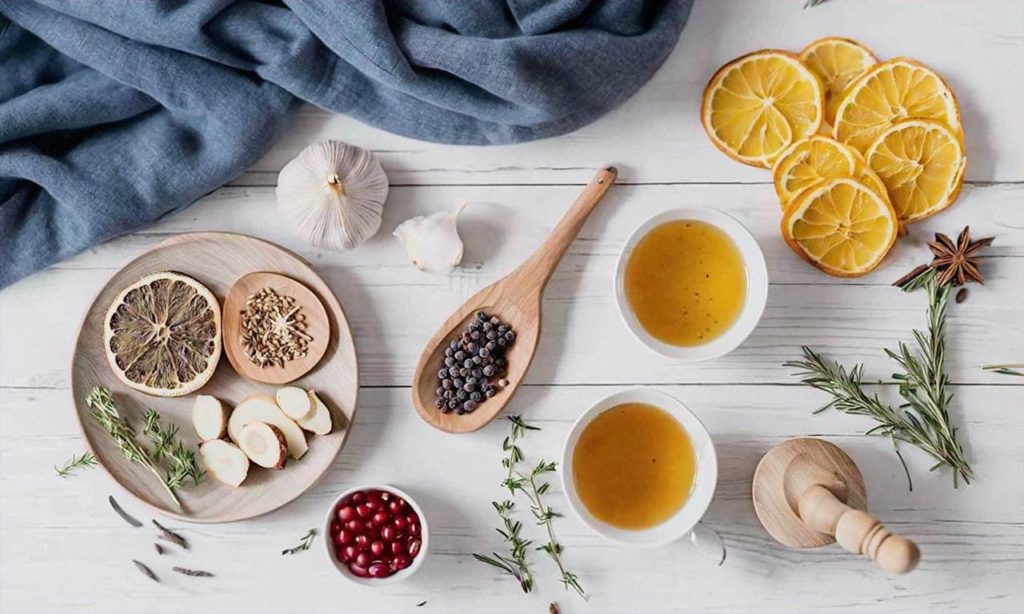
Probiotics are live microorganisms that provide health benefits when consumed. They help boost levels of beneficial bacteria in the gut, crowding out potentially harmful microbes and supporting overall digestive health. Some of the most studied strains of probiotics include Lactobacillus and Bifidobacterium. You can get probiotics from both supplements and certain fermented foods.
Why Probiotics Matter for Winter Wellness
During cold and flu season, probiotics can offer protective effects in a few key ways:
1. They strengthen the gut barrier and prevent “leaky gut,” which occurs when toxins escape the digestive tract into the bloodstream. This can trigger widespread inflammation and hinder immune function if left unchecked.
2. Probiotics regulate communication between the gut and the immune system. A diverse gut microbiome trains immune cells and allows for a measured inflammatory response against pathogens.
3. Beneficial bacteria produce compounds that inhibit the growth of viruses and disease-causing bacteria. For example, certain Lactobacillus strains secrete natural antiviral agents.
As you can see, nurturing a healthy internal ecosystem is foundational for overall wellness during winter. Focus on integrating more probiotic-rich foods into your diet.
Top Probiotic Food Sources
Here are some of the best food sources to increase your probiotic intake:
Yogurt – Look for labels indicating live and active cultures, such as Greek yogurt. The fermentation process preserves the probiotics. Mix in antioxidant-rich berries for added benefits.
Kefir – This fermented milk drink contains up to 50 strains of probiotics. It has a smooth, creamy texture and tart taste. Use it as a base for smoothies, salad dressings or soups.
Sauerkraut – Made from fermented cabbage and other vegetables, sauerkraut offers a tangy crunch. Its shelf-stable nature makes it convenient to incorporate into meals.
Kimchi – This staple Korean side dish contains cabbage, radish and other seasoned veggies. The spicy flavor profile makes a tasty immunity-boosting condiment.
Miso – This nutritious fermented soybean paste makes for an easy probiotic boost in soups, broths and salad dressings. It has an umami-rich, salty taste.
Tempeh – Originating from Indonesia, this fermented soy cake offers plant-based protein and probiotics. Its versatility allows it to be marinated, baked, sautéed or crumbled onto bowls.
Natto – These sticky, slimy fermented soybeans have a distinctive taste and aroma. Mix them into rice, add to dipping sauce or blend into a smoothie.
Pickles – Look for raw, naturally fermented varieties that state “live cultures” rather than vinegar-brined options. They make a probiotic-packed snack or sandwich topping.
Incorporating more of these foods into your diet helps replenish healthy gut flora, which is foundational for immune resilience during cold season. Aim for diversity when selecting probiotic sources, and introduce them gradually to assess digestion. Supporting the gut microbiome is one powerful way to boost winter wellness through immune-strengthening whole foods.
The Best Winter Vegetables for Vitamins and Minerals
When it comes to immune-boosting nutrients, winter vegetables should be at the top of your grocery list. Loading up on produce that’s in season is the best way to get a variety of vitamins, minerals and antioxidants to help support a healthy immune system. As part of an overall immune-boosting diet and lifestyle, eating these cold weather veggies can help strengthen your body’s defenses against illness.
What Makes Winter Veggies So Nutritious?
Many winter squashes, cruciferous vegetables, onions and root veggies that flourish in colder months are packed with exactly the vitamins and minerals that are essential for immune support. This includes vitamin C, vitamin A, zinc and selenium. The natural sugars and complex carbs in these vegetables also provide a great source of energy and fuel for your body’s cells during the winter.
The Powerhouse Nutrients in Winter Vegetables
When looking to stock up on immune-strengthening winter vegetables like squash, kale, carrots and sweet potatoes, make sure to load up on these beneficial nutrients:
Vitamin C: This antioxidant nutrient is vital for immune health. Many dark leafy greens that grow in winter are loaded with vitamin C. Excellent sources include kale, Brussels sprouts, broccoli and red cabbage.
Vitamin A: This fat-soluble vitamin supports the healthy function of your skin, eyes and immune defenses. Deep orange vegetables are your best source of vitamin A, especially winter squash, carrots and sweet potatoes.
Zinc: This mineral plays a role in nearly every aspect of immunity — from activating T-cells to producing antibodies. Great plant-based sources of zinc include winter squash, spinach, mushrooms and pumpkin seeds.
Selenium: This mineral boosts immunity by stimulating the production of white blood cells and antibodies. Onions and mushrooms that grow in winter provide selenium.
Fiber and Prebiotics: The complex carbs and fiber in winter vegetables feed your healthy gut bacteria, which in turn support immune function. Jerusalem artichokes, leeks and onions are excellent prebiotic foods.
The Best Winter Vegetables for Immune Health
Here are some of the top picks for immune-boosting winter vegetables to focus on:
Sweet Potatoes
These vibrant orange beauties are one of the best sources of beta carotene, which your body converts into vitamin A. Just one medium baked sweet potato provides over 600% of your daily vitamin A, as well as vitamin C, potassium and fiber.
Winter Squash
From pumpkin to butternut squash, winter varieties provide a powerhouse combo of vitamins A and C, plus zinc for proper immune responses. The natural sugars are an added bonus to fuel your active immune system.
Carrots
Crunchy, sweet carrots are the ultimate cold weather vegetable thanks to their sky-high levels of immune-supporting vitamin A. Just one large carrot provides over 400% of the recommended daily value.
Kale and Collard Greens
These dark leafy greens thrive in cold weather, allowing you to get a hearty dose of nutrients. Kale and collards are packed with vitamins A, C and K, along with antioxidants to regulate inflammation.
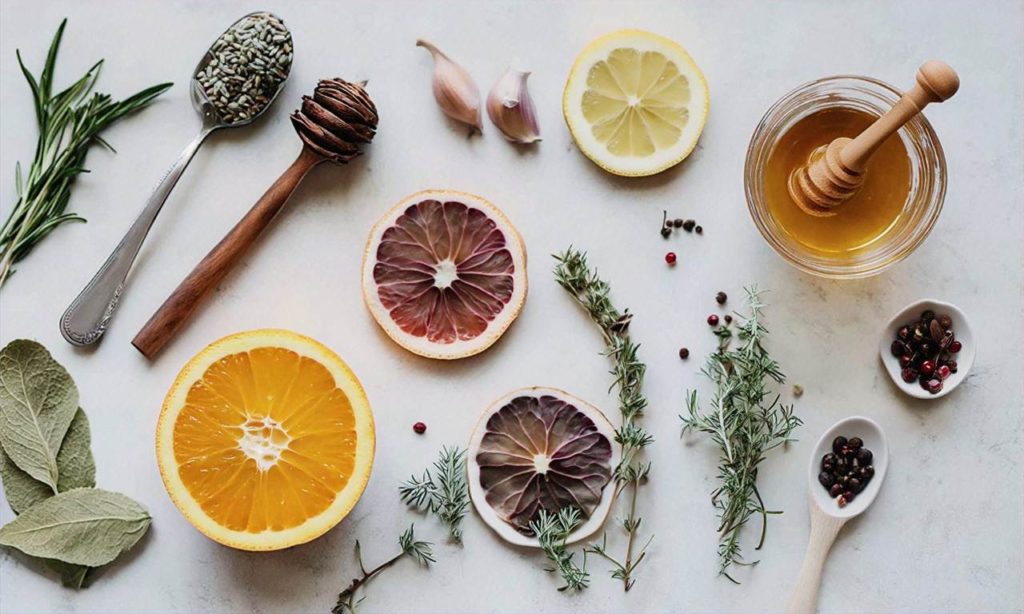
Cauliflower and Broccoli
Part of the nutrient-dense cruciferous family, cauliflower and broccoli flourish in cold climates. They provide antioxidants along with vitamins C, K and A — including a compound called glucoraphanin that specifically boosts immune function.
Mushrooms
Mushrooms of all varieties are immunity all-stars. They are a source of B vitamins for metabolic function, selenium for white blood cell production and antioxidants that control inflammation. Shiitake mushrooms, in particular, contain immunity-boosting beta glucans.
Brussels Sprouts
Small but mighty Brussels sprouts provide the one-two punch of vitamin C and antioxidants in the form of kaempferol — a potent anti-inflammatory for immune support. And as a cruciferous vegetable, they stimulate detoxifying enzymes.
Parsnips and Turnips
Though often overlooked, cold-hardy root vegetables like parsnips and turnips contain almost 100% of many immunity nutrients in just one serving. Turnip greens are also an excellent source of vitamins E, C and K.
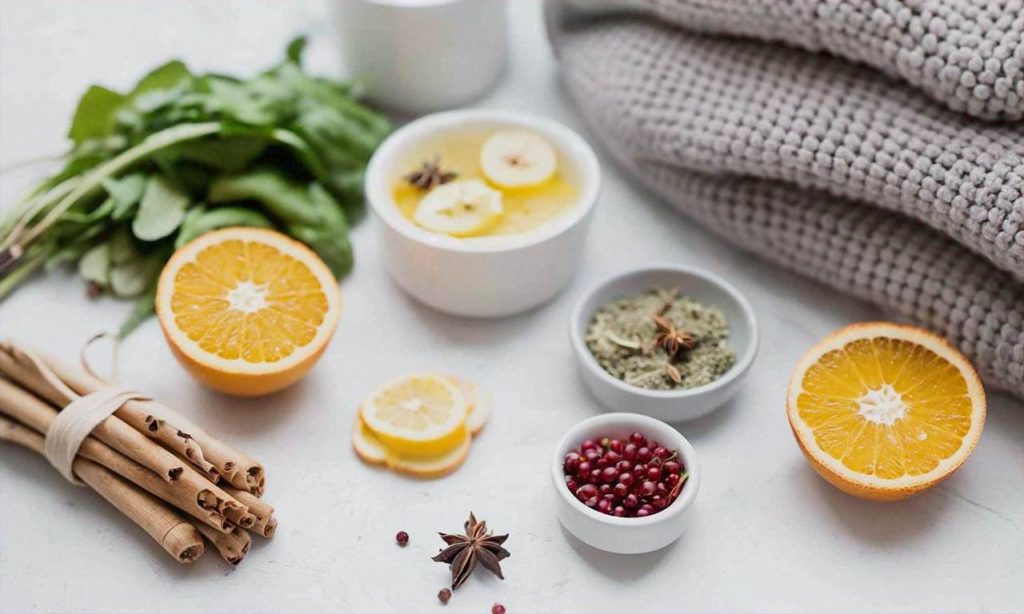
The Bottom Line
When it comes to getting essential vitamins, minerals and antioxidants this winter, make these seasonal immune-boosting vegetables the staples in your kitchen. Loading up on produce that thrives in colder months is the tasty way to help support a healthy immune system. As part of an overall immune-strengthening diet and lifestyle, eating these winter veggies can help strengthen your defenses against illness and keep you feeling your best all season long.
Building a Balanced Diet with Immune-Strengthening Whole Foods
When it comes to supporting your immune system during the cold winter months, a nutritious, balanced diet is key. Eating a variety of fresh, whole foods can provide your body with the vitamins, minerals and nutrients it needs to keep your defenses strong against germs. As you plan your meals and grocery lists, focus on incorporating immune-boosting foods that offer a range of health benefits.
What does a balanced, immune-strengthening diet look like? The key is emphasizing fruits, vegetables, lean proteins, whole grains and healthy fats. Fill at least half your plate with produce, opt for plant-based proteins as well as fish and chicken, choose 100% whole grain breads, pasta and brown rice, and use olive oil and avocados for healthy fats. Hydrate with water and herbal tea. Limit sugar, salt, processed foods and saturated fats from red meat and full-fat dairy.
When building a balanced diet for winter wellness and immune support, aim to include plenty of foods rich in the following nutrients:
Vitamin C – Citrus fruits, red bell peppers, broccoli, strawberries
Vitamin E – Nuts, seeds, spinach, avocado
Vitamin D – Fatty fish, eggs, fortified milk and cereal
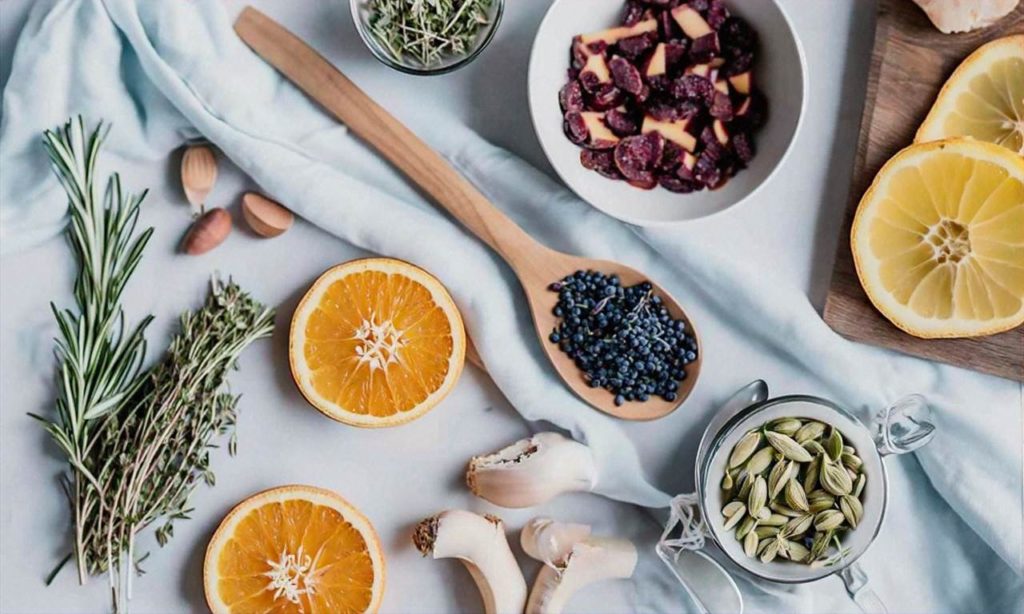
Zinc – Pumpkin seeds, chickpeas, oatmeal
Selenium – Brazil nuts, tuna, spinach
Iron – Lentils, spinach, beef
Protein – Eggs, fish, poultry, tofu, beans, dairy
Focusing on whole foods over supplements provides dietary fiber, antioxidants and beneficial plant compounds that work synergistically to support health. Variety also exposes you to diverse gut-healthy bacteria that strengthen immunity.
Whip up balanced meals and snacks that deliver a nutritional punch. For breakfast, make a vegetable frittata with spinach and mushrooms or overnight oats topped with berries. Lunch can be salmon over greens with quinoa and avocado. Snack on carrots with hummus or Greek yogurt with mixed nuts and seeds. And dinner could be chicken soup with vegetable broth or turkey chili loaded with tomatoes, carrots, beans and zucchini.
Don’t forget the value of meal planning when aiming to eat a more balanced diet. Take time to map out nutritious breakfasts, lunches, dinners and snacks for the week ahead. Prepare a grocery list to stock up on seasonal produce, lean proteins and whole grains. You’ll save money, eat healthier and reduce food waste.
When it comes to achieving balance, remember to also pay attention to your beverage choices. Stay hydrated by sipping herbal tea, warm lemon water or plain water with fruit slices. Limit sugary juices, soda and coffee drinks which can negatively impact blood sugar levels. Alcohol also taxes your immune defenses, so drink moderately.
The right balanced diet for winter wellness is anti-inflammatory and packed with essential vitamins, minerals and antioxidants for whole body health. Focus on getting a rainbow of fruits and vegetables, smart carbs from whole grains, plant-based proteins as well as heart-healthy fish and poultry. Stay hydrated, get plenty of fiber and beneficial probiotics, and limit sugar and unhealthy fats. Paying attention to nourishing, immune-strengthening foods will help keep your defenses strong during cold and flu season.
Lifestyle Tips for Supporting Your Body’s Defenses During Cold Season
As the cold and flu season ramps up, supporting your immune system through diet and lifestyle choices becomes especially important. While nutrient-dense foods can provide key vitamins, minerals and antioxidants for immunity, certain daily habits also impact how well your body can fight off bugs. By making some simple adjustments to your self-care routine during the winter months, you may bolster your defenses against illness.
Get Plenty of Sleep
Adequate, high-quality sleep is essential for a properly functioning immune system. Adults should aim for 7-9 hours of shut eye per night, while children need even more. Being well rested enhances the activity of immune cells and infection-fighting antibodies within the body. Fatigue weakens these defenses, making you more prone to coming down with a cold or flu. Be sure to maintain a consistent sleep schedule and wind down nightly without blue light exposure from phones and screens. The better you sleep, the better your body can ward off pathogens.
Exercise in Moderation
Regular, moderate physical activity supports a robust immune response; however, taking your workout intensity too far can have the opposite effect. High-intensity and prolonged exercise sessions may temporarily depress immune function. Aim for 150 minutes per week of moderate activity like walking, gentle yoga, tai chi or leisurely bike rides. Spread exercise sessions throughout the week rather than completing them all at once. This provides an immune boost without being excessive.
Manage Stress Levels
Chronic or acute stress triggers the release of hormones like cortisol into the bloodstream, which can suppress immune system cells that fight off viruses and other bugs. This makes stressed individuals more susceptible to illness during cold season. Actively focus on stress management by carving out time for relaxation practices like meditation, deep breathing, journaling or soothing music. Even a few minutes per day can help counter the immune-suppressing effects of stress.
Stay Hydrated
Drinking adequate fluids is vital for flushing pathogens out of the body and transporting key immune cells throughout the bloodstream. Water, herbal teas and broth-based soups are ideal choices. Caffeinated and alcoholic beverages can be dehydrating, so these should be consumed in moderation. Pay attention to the color of your urine – a pale yellow indicates proper hydration, while dark yellow urine is a sign that you need more fluids, especially in winter when respiratory viruses are most prevalent.
Wash Hands Frequently
Hand hygiene is arguably the most effective way to avoid contracting or spreading infections. Wash hands with warm water and soap for at least 20 seconds before eating and after using the bathroom, riding public transportation, touching your face or blowing your nose. When soap and water aren’t available, alcohol-based hand sanitizer can work in a pinch. Avoid touching your eyes, nose or mouth unless your hands are clean. Encourage handwashing among family members too.
Sanitize Surfaces
Cold and flu viruses can live on hard surfaces for up to 48 hours in some cases. Disinfect frequently handled objects like doorknobs, light switches, remote controls, phones and keyboard. Clean kitchen and bathroom countertops daily using EPA-approved disinfecting solutions. Soaking cutting boards, utensils and dishes in hot water after meals can help kill germs. Designate separate chopping boards for produce and raw meats to avoid cross contamination. Keeping your home sanitary reduces viral load in your surroundings.
Humidify Indoor Air
Heating systems can dry out indoor air during winter, making airways more vulnerable to infection. Run humidifiers to keep humidity levels around 40-60%, which may deactivate some viruses. Or place bowls of water near heat vents so the moisture can evaporate into the air naturally. Proper humidity makes it harder for pathogens to take hold in nasal passages and airways. This simple adjustment may offer immune protection.
Avoid Touching Your Face
Hands come into frequent contact with surfaces harboring germs, so resist touching your eyes, nose and mouth unless you’ve just washed up. The mucous membranes of the face provide an easy entry point for pathogens into the throat, sinuses and respiratory tract. Making a conscious effort to keep fingers away from your face decreases odds of self-inoculation with cold or flu viruses.
Stay Home When Sick
If you do come down with a cold or flu, isolating yourself at home prevents the spread to more vulnerable individuals. Viruses are most contagious in the first few days of illness. Wear a protective face mask if you must go out in public while symptomatic. Notify close contacts about your sickness so they can take protective measures as well. Following isolation guidelines protects friends, family and coworkers too.
Supporting your body’s defenses during cold season boils down to general self-care habits like proper rest, nutrition, hydration and hygiene practices. While some exposure to cold viruses is inevitable, making immunity and wellness a priority can help you stay healthy. Implementing even a few of these lifestyle tips may make all the difference in dodging the seasonal bugs making the rounds.





No comment yet, add your voice below!